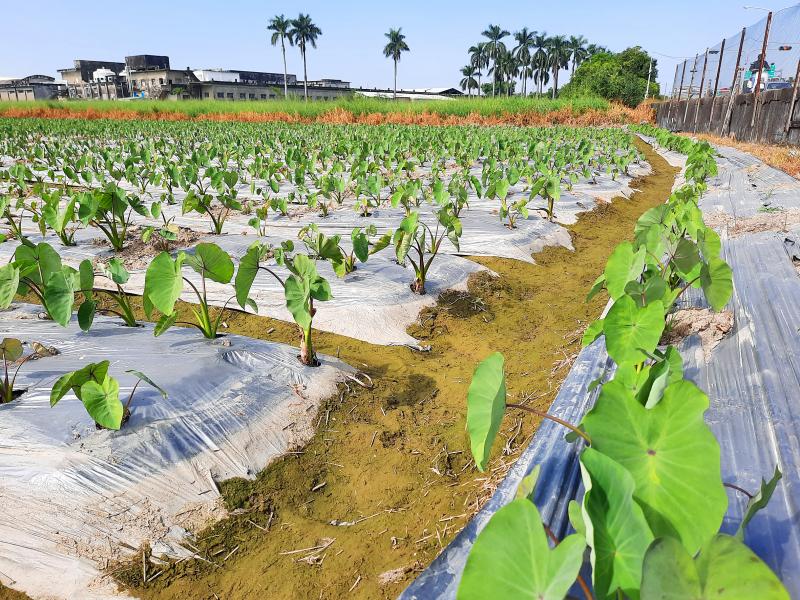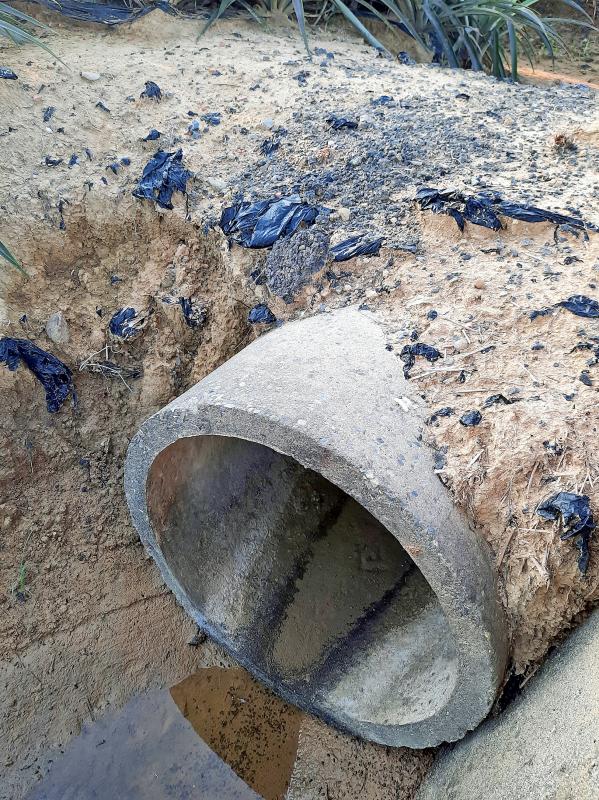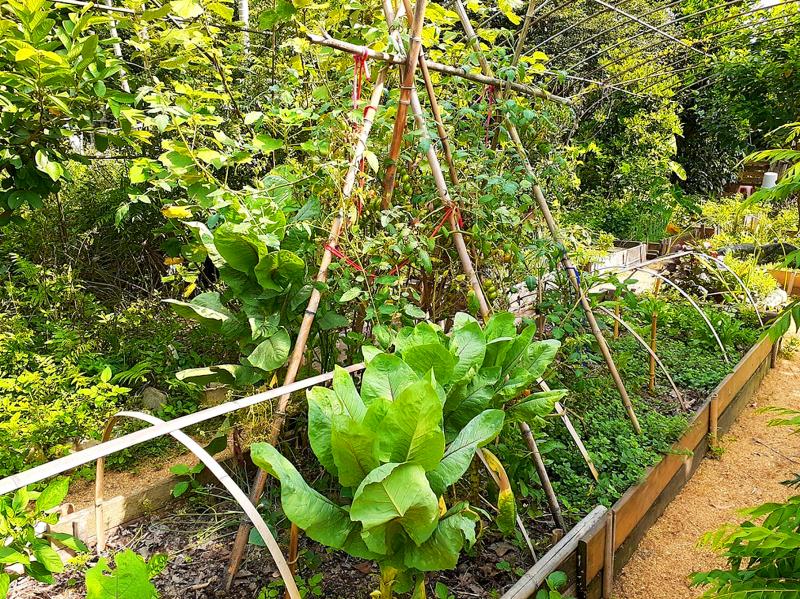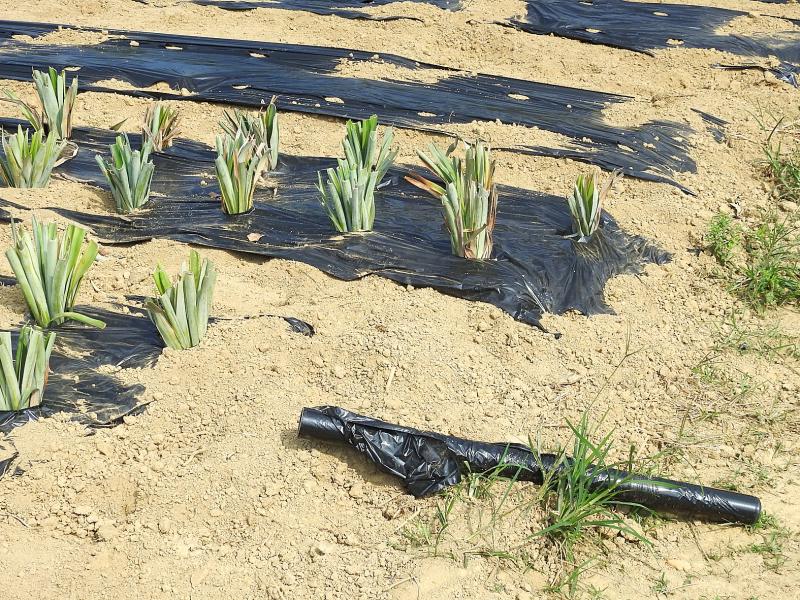In Taiwan’s rural lowlands, it’s a common sight at this time of year. Having cleared and plowed their fields, farmers intending to grow pineapples, strawberries or certain other crops, roll lengths of thin black plastic across the ground. To keep the film in place, soil is piled over the edges.
Plastic sheeting — or plastic mulch, as it’s often called — makes farmers’ lives easier by suppressing unwanted foliage that might otherwise crowd out their crops.
As an inexpensive labor-saving technique, its appeal is obvious. Taiwan’s farmers are getting old (in 2014, their mean age was 62 years), and finding hired help willing to pull weeds isn’t easy.

Photo: Steven Crook
Those who defend the use of synthetic mulch also claim it can reduce the use of insecticides. By reflecting light, the plastic repels certain pests, among them thrips (which damage fruits and legumes), spider mites (10 of Taiwan’s 74 spider-mite species are considered major pests) and whiteflies (which transmit plant viruses).
AGRICULTURAL PLASTICS
But one of its drawbacks is obvious to anyone who takes a close look at the landscape. Countless fields are strewn with shreds of black plastic. As these scraps break apart and break down, they turn into microplastics (fragments no more than 5 mm in length) and nanoplastics (particles so small they can penetrate human organs and tissues).

Photo: Steven Crook
In recent years, scientists have realized that plastics pollution isn’t limited to the bags, bottles and other visible trash that lingers by roadsides or washes up on beaches. Microplastics have been found on mountain tops, in bottles of mineral water fresh from the manufacturer, in seafood, inside fruits and vegetables grown far from industrial zones, and in human feces.
Because this is a relatively new phenomenon, scientists aren’t clear as to the effect of microplastics on human health. But it probably isn’t good.
The Environmental Protection Administration’s (EPA) Web site warns farmers that they face punishment if they discard or burn agricultural plastics, yet this law seems no more effective than others against littering. The EPA also recommends the use of alternative materials such as decomposable film (typically three times the price of conventional plastic mulch) or straw.

Photo Courtesy of Tammy Turner
Jarl Enterprise — a Kaohsiung-based manufacturer of agricultural implements that sells 400-meter-long, 1.83-meter-wide rolls of silver-black insect-proof plastic mulch for NT$1,860 — says in an e-mailed response that it can produce biodegradable films, but due to low market demand, it doesn’t.
SAFER ALTERNATIVES
Compared to plastic, using straw is less likely to lead to soil salinization. It’s also better for the spiders and insects that prey on crop pests.

Photo: Steven Crook
“Taiwan is less responsible than other countries when it comes to the use of plastic in agriculture,” says Tammy Turner, an American who’s been practicing permaculture, a holistic environmental and agricultural design system, for 15 years, and teaching it in certification courses in Taiwan, India and China for 9 years.
“Its use has already been identified as problematic by the authorities and by some people who work in food production,” Turner says.
On March 31, the Chinese-language China Times reported that Miaoli County Government’s Agriculture Department and Environmental Protection Bureau are trying to improve the recycling rate for the 250-odd tonnes of plastic mulch discarded by strawberry farmers in Dahu Township (大湖) at the end of each growing season.
When the film is mixed with soil or field stubble, recycling businesses are reluctant to process it, so the authorities have encouraged farmers to pre-clean the plastic, and offered subsidies for the purchase of specialized recycling machines.
Rather than focus on recycling, Turner favors the use of organic mulches, and a change in attitude.
“Because they grow so fast in Taiwan’s weather, among local farmers there’s zero tolerance for weeds — even though they grow in synergy, not in competition, with crops,” she says.
Taiwanese indigenous polyculture is far more weed-tolerant, she explains. Aboriginal agriculturalists regard each and every plant as having its own place in the ecosystem. By observing what others may regard as “weeds,” they can know something about the health and characteristics of the soil.
Oftentimes, those plants are sources of food or medicine.
“Indigenous farmers see everything as edible or useful, because indigenous communities have retained certain traditional knowledge. The Amis people are particularly skilled in this way,” Turner says.
Because sheeting traps heat in the topsoil, it can help kill off pathogens, the seeds of weed species and nematodes (microscopic roundworms that penetrate the roots of certain plants so they can lay their eggs inside).
Heating up the soil is hardly ever beneficial, Turner says. In fact, it often brings a set of fresh problems.
While acknowledging that the convenience of plastic mulch, a 2018 report on the News&Market Web site describes how synthetic sheeting can make crops unhealthy.
Plastic mulch prevents moisture in the soil from evaporating. This leads to a concentration of moisture under the sheets, which means that fertilizer in the soil is drawn up toward the surface. Because they can find both water and fertilizer near the surface, plants don’t establish deep roots.
The consequences of this are twofold. Being so close to the plastic mulch — which can reach noontime temperatures above 70 degrees Celsius — the roots are in greater danger of suffering heat stress. Also, if the root system is shallow, it’s more likely to be damaged if a typhoon strikes.
Planting crops, along with their companion plants, more densely is one way to reduce the number of weeds. This also supplies a secondary yield, such as aromatic flowers or herbs, Turner says.
ORGANIC MULCH
Permaculture practitioners see organic mulches as far superior to plastic mulches.
“The soil gets more organic matter and higher levels of microbiological activity that improves nutrient uptake and water retention,” Turner says.
“Soil health wasn’t much thought about until a few years ago, but now regenerative agriculture is being promoted by the Council of Agriculture,” she explains. “Once you’ve got your soil to a specific level of health, you don’t really need fertilizer. You’re simply cycling organic matter and nutrients.”
According to Turner, farmers who resort to plastic mulches “are often creating the conditions for soil erosion. Lots of chemical and labor inputs are required to support that kind of system, and it further degrades the system.”
Organic mulch can be free.
“By growing different plants in succession, a farmer could — possibly in cooperation with neighboring farmers — produce all the mulch he needs,” Turner says.
Banana trunks are a great source of mulch, because they contain so much fiber and water, Turner says. Some indigenous farming systems use pigeon peas. Grasses and tree leaves can be deployed as mulch. Turner also uses rice husks, peanut shells, crushed-up bamboo and “green manure” (plants grown and plowed into the soil to improve its quality).
Rice-straw mulch may be suitable for commercial farms where rapid growth is desired, Turner says, but she warns that if the rice was sprayed with chemicals, the straw may be tainted by residues, an issue with many agricultural byproducts.
PERMACULTURE
Turner argues that land cultivated via permaculture design concepts and regenerative agricultural practices can be more productive over time than land farmed conventionally through soil building, yield diversification and risk mitigation.
“Depending on what you’re growing, the amount of light reaching the food plants is key,” she explains. “Fast-growing trees can be the source of mulch, animal feed... that helps build soil and regenerates itself after regular harvesting, thus reducing photosynthetic competition.”
Turner adds that Taiwan is ripe for doing much better in using trees and woody perennials in its growing systems. This would result in better water retention, less runoff, better retention of topsoil, which is where the nutrients are, and improve soil biology.
Unfortunately, the current subsidy system works against such practices.
“You can’t have trees in a farm field, because that’s seen as letting your field go fallow,” Turner laments.
Yet, she says, the principal source of resistance isn’t the government: “Farmers are by nature conservative, so we need to create successful examples to win people over.”
Turner’s permaculture classes are increasingly popular with young people: “Half of them are under 25. The youngest is 16. They’re definitely willing to try a new approach, but they lack access to land.”
That could soon change. So many old farmers are leaving the scene that Turner thinks Taiwanese agriculture could be entering a decade of great opportunity. “I’m telling my students to urge their parents or grandparents to hand over their land.”
Steven Crook, the author or co-author of four books about Taiwan, has been following environmental issues since he arrived in the country in 1991. He drives a hybrid and carries his own chopsticks. The views expressed here are his own.

Towering high above Taiwan’s capital city at 508 meters, Taipei 101 dominates the skyline. The earthquake-proof skyscraper of steel and glass has captured the imagination of professional rock climber Alex Honnold for more than a decade. Tomorrow morning, he will climb it in his signature free solo style — without ropes or protective equipment. And Netflix will broadcast it — live. The event’s announcement has drawn both excitement and trepidation, as well as some concerns over the ethical implications of attempting such a high-risk endeavor on live broadcast. Many have questioned Honnold’s desire to continues his free-solo climbs now that he’s a

As Taiwan’s second most populous city, Taichung looms large in the electoral map. Taiwanese political commentators describe it — along with neighboring Changhua County — as Taiwan’s “swing states” (搖擺州), which is a curious direct borrowing from American election terminology. In the early post-Martial Law era, Taichung was referred to as a “desert of democracy” because while the Democratic Progressive Party (DPP) was winning elections in the north and south, Taichung remained staunchly loyal to the Chinese Nationalist Party (KMT). That changed over time, but in both Changhua and Taichung, the DPP still suffers from a “one-term curse,” with the

Jan. 26 to Feb. 1 Nearly 90 years after it was last recorded, the Basay language was taught in a classroom for the first time in September last year. Over the following three months, students learned its sounds along with the customs and folktales of the Ketagalan people, who once spoke it across northern Taiwan. Although each Ketagalan settlement had its own language, Basay functioned as a common trade language. By the late 19th century, it had largely fallen out of daily use as speakers shifted to Hoklo (commonly known as Taiwanese), surviving only in fragments remembered by the elderly. In

William Liu (劉家君) moved to Kaohsiung from Nantou to live with his boyfriend Reg Hong (洪嘉佑). “In Nantou, people do not support gay rights at all and never even talk about it. Living here made me optimistic and made me realize how much I can express myself,” Liu tells the Taipei Times. Hong and his friend Cony Hsieh (謝昀希) are both active in several LGBT groups and organizations in Kaohsiung. They were among the people behind the city’s 16th Pride event in November last year, which gathered over 35,000 people. Along with others, they clearly see Kaohsiung as the nexus of LGBT rights.